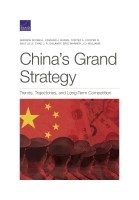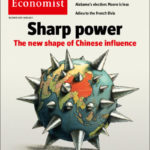 The Chinese Communist Party (CCP) is employing a suite of tactics to advance its strategic influence in countries around the world, in the process exploiting and exacerbating democratic weaknesses in target states and actively popularizing an authoritarian alternative to democratic governance, according to a new Brookings analysis.
The Chinese Communist Party (CCP) is employing a suite of tactics to advance its strategic influence in countries around the world, in the process exploiting and exacerbating democratic weaknesses in target states and actively popularizing an authoritarian alternative to democratic governance, according to a new Brookings analysis.
The goal of Washington’s China strategy should be a world in which democracy is the predominant form of national governance and that requires investments focused on winning the competition of political systems, argue analysts Patrick W. Quirk, David O. Shullman and Johanna Kao.
Three pillars of action should comprise the U.S. approach to protecting and promoting democratic governance, working with like-minded allies, to prevail against China in the contest of political systems, they contend:
-

National Endowment for Democracy (NED)
The first pillar consists of elevating the protection and promotion of democracy as a key consideration in crafting and executing U.S. foreign policy; and being deliberate about formulating the network of allies necessary to win the broader competition. Along with placing democracy support at the center of U.S. foreign policy decision-making, Washington should expedite the formalization of the D-10 as a forum for leading democracies to coordinate.
- The second pillar involves using foreign assistance and diplomacy to make countries more resilient to CCP coercion. Specific actions include reinforcing the foundational institutions of democracy to bolster them against external interference; strengthening the capacity of civil society to uncover corruption, increase transparency, and hold leaders accountable; and expanding the ranks and capacity of independent, investigative journalists and civil society organizations able to expose Chinese malign influence tactics.
- The third pillar is championing the superiority of liberal democracy to authoritarianism. Specifically, Washington should empower U.S. diplomats to champion the benefits of American democracy, while being frank that it remains a work in progress; tailor messaging to highlight examples of democracy successes that are relevant to the target audience; and expand citizen diplomacy exchanges — to the United States and other countries — so that individuals in countries vulnerable to or experiencing CCP influence can see the fruits of democracy first-hand.
 The United States needs to counter China’s attempts to block the free flow of information, argues Shay Khatiri. The U.S. should limit the sharing of digital technology with China by U.S. allies and partners and create incentives for Chinese engineers and data scientists to leave China for the United States or allied nations, he writes for The Bulwark:
The United States needs to counter China’s attempts to block the free flow of information, argues Shay Khatiri. The U.S. should limit the sharing of digital technology with China by U.S. allies and partners and create incentives for Chinese engineers and data scientists to leave China for the United States or allied nations, he writes for The Bulwark:
Additionally, this requires an increase of funding for and better management of the U.S. Agency for Global Media to boost their Chinese-language operations, taking measures to punish China’s censorship of information and internet, and increase of funding for the National Endowment for Democracy and its two subsidiaries, the International Republican Institute and the National Democratic Institute. The U.S. should also consider invoking the Global Magnitsky Act to increase support for Chinese dissidents, especially Uighurs but also Han Chinese.
*Quirk and Kao are analysts with the International Republican Institute, a partner of the National Endowment for Democracy (NED).
The United States needs to counter China’s attempts to block the free flow of information & increase funding for the @NEDemocracy and its two subsidiaries, @IRIglobal & @NDI https://t.co/aC1VRSX4yG via @BulwarkOnline
— Democracy Digest (@demdigest) September 15, 2020







